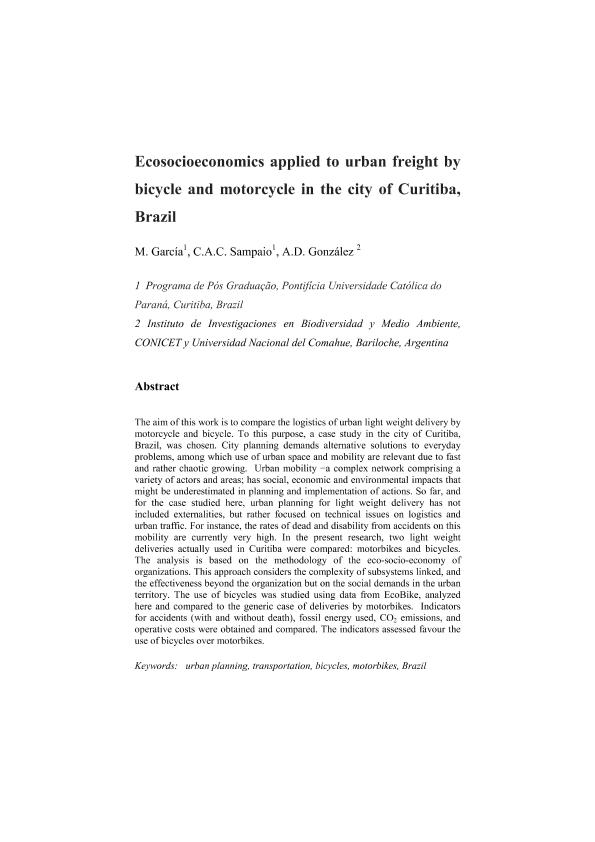Mostrar el registro sencillo del ítem
dc.contributor.author
García, M.
dc.contributor.author
Sampaio, C. A. C.
dc.contributor.author
Gonzalez, Alejandro Daniel

dc.date.available
2017-01-23T20:55:16Z
dc.date.issued
2014-10
dc.identifier.citation
García, M.; Sampaio, C. A. C.; Gonzalez, Alejandro Daniel; Ecosocioeconomics applied to urban freight by bicycle and motorcycle in the city of Curitiba, Brazil; Wessex Institute Press; WIT Transactions on Ecology and the Environment; 191; 10-2014; 713-722
dc.identifier.issn
1743-3541
dc.identifier.uri
http://hdl.handle.net/11336/11735
dc.description.abstract
The aim of this work is to compare the logistics of urban light weight delivery by motorcycle and bicycle. To this purpose, a case study in the city of Curitiba, Brazil, was chosen. City planning demands alternative solutions to everyday problems, among which use of urban space and mobility are relevant due to fast and rather chaotic growing. Urban mobility −a complex network comprising a variety of actors and areas; has social, economic and environmental impacts that might be underestimated in planning and implementation of actions. So far, and for the case studied here, urban planning for light weight delivery has not included externalities, but rather focused on technical issues on logistics and urban traffic. For instance, the rates of dead and disability from accidents on this mobility are currently very high. In the present research, two light weight deliveries actually used in Curitiba were compared: motorbikes and bicycles. The analysis is based on the methodology of the eco-socio-economy of organizations. This approach considers the complexity of subsystems linked, and the effectiveness beyond the organization but on the social demands in the urban territory. The use of bicycles was studied using data from EcoBike, analyzed here and compared to the generic case of deliveries by motorbikes. Indicators for accidents (with and without death), fossil energy used, CO2 emissions, and operative costs were obtained and compared. The indicators assessed favour the use of bicycles over motorbikes.
dc.format
application/pdf
dc.language.iso
eng
dc.publisher
Wessex Institute Press
dc.rights
info:eu-repo/semantics/openAccess
dc.rights.uri
https://creativecommons.org/licenses/by-nc-sa/2.5/ar/
dc.subject
Urban Planning
dc.subject
Transportation
dc.subject
Bicycles, Motorbikes,
dc.subject
Brazil
dc.subject.classification
Estudios Urbanos

dc.subject.classification
Geografía Económica y Social

dc.subject.classification
CIENCIAS SOCIALES

dc.title
Ecosocioeconomics applied to urban freight by bicycle and motorcycle in the city of Curitiba, Brazil
dc.type
info:eu-repo/semantics/article
dc.type
info:ar-repo/semantics/artículo
dc.type
info:eu-repo/semantics/publishedVersion
dc.date.updated
2016-12-12T14:20:41Z
dc.journal.volume
191
dc.journal.pagination
713-722
dc.journal.pais
Reino Unido

dc.journal.ciudad
Southampton
dc.description.fil
Fil: García, M.. Pontifícia Universidade Católica do Paraná; Brasil
dc.description.fil
Fil: Sampaio, C. A. C.. Pontifícia Universidade Católica do Paraná; Brasil
dc.description.fil
Fil: Gonzalez, Alejandro Daniel. Consejo Nacional de Investigaciones Científicas y Técnicas. Centro Científico Tecnológico Patagonia Norte. Instituto de Investigación en Biodiversidad y Medioambiente; Argentina. Universidad Nacional del Comahue; Argentina
dc.journal.title
WIT Transactions on Ecology and the Environment
dc.relation.alternativeid
info:eu-repo/semantics/altIdentifier/url/https://www.witpress.com/elibrary/wit-transactions-on-ecology-and-the-environment/191/29551
dc.relation.alternativeid
info:eu-repo/semantics/altIdentifier/doi/http://dx.doi.org/10.2495/SC140601
Archivos asociados
